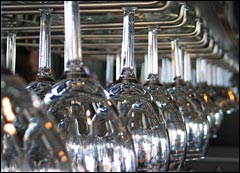Dear Umbra,
Why haven’t phosphates been removed from dishwashing detergents like they have been from laundry detergents? I know they make your clothing look brighter, but what do they do for dishes?
Natalie Waddell-Rutter
North East, Pa.
Dearest Natalie,
Phosphates in dish detergent do a few nice things for dishwasher-washed dishes. Their biggest contribution is that they essentially soften the effects of “hard” water, combining with the minerals in it, mostly calcium and magnesium, thereby eliminating the spots and film on dishes that can form when the minerals and food bits combine during the wash. Phosphates also make the water’s pH more alkaline, which can help in food-bit removal.

Eternal sunshine of the spotless glass.
Photo: iStockphoto
This is also basically what phosphates did for clothes in the clothes washer, essentially making the detergent more effective by getting the minerals out of the way. But that was back when laundry detergent companies in the U.S. still used phosphates. Now they don’t.
Which brings us to your question.
Back in the 1970s, the U.S. government recognized the problem of phosphorus pollution — it can cause massive algal blooms in waterways that screw with ecosystems by robbing the water and aquatic life of all-important oxygen — and started trying to come up with alternatives. Meanwhile, states and localities became more and more aware of the undesirable effects of phosphorus and began acting on their own to limit or restrict its use in laundry detergents, the first places being five cities in Illinois in 1971. (Way to go, Illinoisans!) By the 1990s, enough states and localities had limited or restricted laundry-detergent phosphates that detergent companies saw the writing on the machine and decided to voluntarily phase them out in all domestic formulations, which was done by the mid-1990s.
The main reason dishwashing-detergent phosphates didn’t get the same treatment was that the best alternatives, enzymes, were neither common nor cheap even as late as the early ’90s. There was also the influence of heavy lobbying by detergent makers and phosphate cheerleaders to keep them in. And so phosphates remain in many detergents at varying levels, even though they don’t need to be there.
There are plenty of eco-friendly, phosphate-free alternatives that wash dishes just as well or better than phosphate-laden ones. And you probably won’t be surprised to learn that mainstream, big-name detergents have lots of other suspect ingredients that are derived from petroleum and aren’t so environmentally benign, a main one being artificial fragrances. So it’s best to use one of the eco-brands anyway, and any eco-brand worth its eco-label will be phosphate- and chlorine-free.
Some states and localities are starting to severely limit or ban phosphates in dishwasher detergent too. My spiffy home state of Washington signed new rules into law this year that will keep the phosphorus content in dishwashing detergent to 0.5 percent beginning in 2010. It’s a significant cut, since detergents now contain up to 9 percent.
The soap we use to wash dishes by hand doesn’t contain phosphates, but don’t get any bright ideas about using it in your dishwasher. I did that once, and suds oozed out the sides and all over the kitchen floor.
Spotlessly,
Umbra


